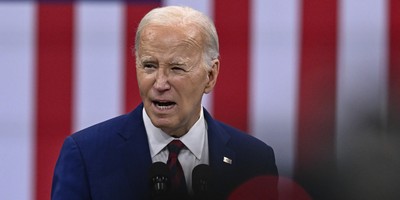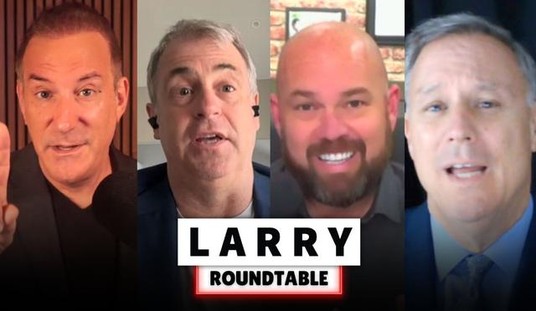Holly Fretwell, an economist by training, has done her best to bring some needed critical thinking to the global-warming debate by writing “The Sky’s Not Falling! -- Why It’s OK to Chill About Global Warming.” Aimed at 8- to 12-year-olds and their parents, it is a good, reasoned, 115-page antidote to the Chicken Little hysteria and propaganda found in the mainstream media and in places like Laurie David’s kids book “The Down-to-Earth Guide to Global Warming.” Fretwell is a research fellow who focuses on natural-resource issues and public-lands management at the free-market Property and Environment Research Center (PERC) in Bozeman, Mont. I talked to her by telephone on Wednesday, Jan. 16:
Q: The sound-bite synopsis of your position on climate change or global warming is what?
A: Really it's that I am tired of seeing propaganda and I want people to understand the truth and to know what some of the best possible alternatives are to solving all the different issues throughout the world -- not just global warming. I want people to become critical thinkers.
Q: What do you say is going on with climate change?
A: We do see the Earth is warming. We are coming out of an ice age and we’d expect to see some warming. The Earth has warmed and cooled and warmed and cooled and warmed and cooled many, many times over its history -- long before humans were on Earth and also since humans have been on Earth. We do see a correlation between CO2 in the atmosphere and temperature change in present times and even if we go back into history.
But as any scientist can tell you, correlation is not causation. We need to be very careful about that. We have a lot of people out there trying to tell us that because one thing is happening, it’s causing another thing, when, in fact, we really don’t know that. There’s a lot of uncertainty out there.
If you actually go back and look at the data that shows CO2 levels and temperature changes over the last 650,000 years, what we find is that temperature actually changes first and CO2 in the atmosphere follows that temperature change. Maybe I should say that again: Temperature changes first. CO2 lags the temperature change. We know that humans are emitting CO2; the point being, however, there is no reason to believe that CO2 is causing temperature change when it is following temperature rises over the history of the data we have.
Recommended
Q: What’s the biggest whopper you’ve heard about global warming that is being aimed at either your kids or at school kids in general?
A: That humans are terrible, terrible polluters and we’re ruining the world. There was a show with Linda Ellerbee on Nickelodeon several months back, and I sat down and I watched it with my kids. My youngest son looked at me after the show and he said, “Mom, is this show really way out of the ballpark or are we all going to die?”
Q: And how old is he?
A: Eight.
Q: At least he’s asking the right questions.
A: He is. But shows like that really scare people. I don’t think that’s necessary. I really want to educate people and let them try to solve the problems instead of trying to scare them into being afraid of things.
Q: There is a lot of science that we don’t know yet, as you stress in the book. And you also stress that we shouldn’t panic, like Chicken Little, but try to understand what is really happening and why it is happening. What’s the most important thing about global warming that we still don’t know?
A: Why climate changes. We really don’t know. We know so much, and we have so many ideas of why climate changes and how all these different factors may impact climate. But we really don’t understand how they all work together or which ones override the others. We’re talking about the energy that’s coming from the sun, the way the Earth travels around the sun; we have all sorts of cycles like Milankovitch Cycles, etc., that have some impact on the climate.
But we really don’t know how they work together and we’re really not very good at predicting how they work together. Think about how well we are at predicting the weather tomorrow or next week and now try to extend that out 100 years. We’re really no better at predicting long-term climate change than we are at predicting short-term climate, although they are two very different things.
Q: Is there any chance of getting your book placed in grade schools -- or schools of journalism?
A: Perhaps if I was a millionaire and bought them and handed them all out. ... I think the chance of this getting out really widespread is slim, but the reason I wrote the book is because I want at least a few people to get it out there, begin to understand the knowledge and then pass it on. It’s going to be a slow process. But nature is helping me out a little bit, and so are scientists, because it’s becoming a little more accepted that, “Gosh, maybe it’s not CO2 and humans that are causing this change in climate. Maybe there is a lot more natural variability out there than we previously thought there was or than we previously heard about."
Q: There’s almost as much economics in your book as science. How does economics help you explain what’s going on with climate change?
A: I’m trained as an economist, hence the reason there’s more economics in there, and I’m trained as a policy analyst, and economics has a huge impact on policy and policy implications. My biggest fear about what people are learning about climate change is that, “Oh, my gosh, we have to put on all these regulations and stop people from emitting CO2 and tax everybody and do all sorts of things that are going to cost us an immense amount of money.”
I believe we should have a cleaner environment; we should try to improve our environment and there are some ways that are better at doing that than others. I don't think making people pay huge costs for emitting CO2 is very productive and I don’t think it is providing benefits that are greater than what it would cost us to do.
A big part of why I have gone into so much economics is that I want people to look at the alternatives and the trade-offs and to make some rational choices. If we spend all this money reducing CO2 emissions, we can’t spend that money on other things that can have far greater impact on improving human welfare, improving our environment, providing long-term benefits to society, individuals and wildlife that are far, far greater than reducing CO2 emissions.
Q: Do you have a favorite example of something that was invented -- like the air conditioner example in your book -- that shows how markets and human ingenuity can solve some of these global warming problems better than governments?
A: I have more general examples than a very specific example, and that is, as developed countries become more developed and wealthier, we’ve been able to spend a lot more money and we’ve focused a lot more on cleaning up our environment. This is pretty common and it makes a lot of sense; it’s fairly intuitive sense. As we become wealthier we are not so concerned with feeding ourselves, getting shelter and feeding our children. Now we have a little bit more disposable income. We’ve taken care of some of those crucial issues to life, and now we can take some of our resources and start thinking more about our longevity and some of the amenities that exist around us. We want cleaner air, we want cleaner water, both because it makes us live longer but because it is more enjoyable.
If we can’t pay to put food on our table, we don’t have any money to be concerned with those issues. Taking care of our basic needs is really important, and beyond that, then we can start thinking about the environment. Developing countries like China and India, they are still trying to take care of their basic needs. It’s really hard to get them to start thinking about taking care of their environment when they can barely put enough food on their table to feed themselves. So to me, this is one of the places where we’ve seen example after example of markets being very effective at improving people’s wealth and well-being far better and far faster and far more effectively than command-and-control societies.
Q: What’s an “enviropreneur” and why do you encourage kids to become one?
A: Enviropreneurs are people who are out there protecting the environment and making a profit while they are doing it. I encourage everybody to be enviropreneurs because I do care about the environment; that’s why I live in Montana, because it’s a beautiful place to be. If you can actually make money or make a living while you are improving the environment, then it makes everybody well off. It’s the old adage of Adam Smith's -- “doing well by doing good.”
Q: Are you fighting a winnable battle? Most adults don’t question the consensus view on global warming or accept that it’s man’s fault and there will be a big problem if we don’t do something drastic soon.
A: I’m an optimist and I think I’m fighting a winnable battle. As more information becomes available, as science gets better -- science is about learning -- we’ll understand more and people will start to get a better grasp of what’s going on out there. Sad to say, on the other side, as that stuff starts to happen, the interest in global warming will sort of wane and some other big issue that people are going nuts over -- whether it’s right, wrong or otherwise -- will gain a lot more attention and people will focus there instead. I just hope I can help this battle move forward before we have lots of costly regulations that provide us little benefit at a huge cost.
Q: Have you seen kids "get" these arguments -- it’s counter to the liberal media consensus.
A: I think a big part of it is working through things with kids. It’s not just a kid sitting down and reading a book and saying, “Oh, gosh, now what am I to believe?” With kids, you really have to sit down and talk with them. So I wrote the book not just for kids but also for parents -- and any other adult for that matter -- to read together and to explore together.
Again, not just to think about global warming, because I think the issues about global warming will eventually wane -- but to become critical thinkers so they can learn to think outside of the box on many, many different issues and to be able to look at information and say, “OK, here’s what I gather from this information, but there are lots of questions to be asked still. I have to ask some of those questions. Let’s find a way to come up with some answers to those questions” -- and then do some comparisons.
In fact, a great way to look at my book is to sit down with my book and sit down with Al Gore’s movie or Laurie David’s book and read both of them side-by-side and say, “OK, wait a minute here. There are some differences here. They show the exact same graph but they come up with some very different implications from that graph. Let’s look closer ourselves and figure it out.”

























Join the conversation as a VIP Member